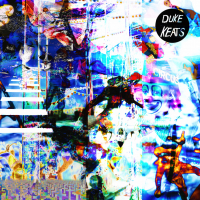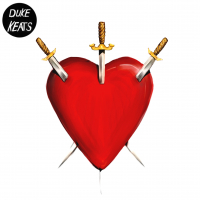'Dirty Glamour' EP by Duke Keats
Review
The length of the heads up that I'm able to give you in relation to the new Duke Keats EP, ‘Dirty Glamour' while not quite a record for the magazine is nonetheless a generous one as it can be yours from June 9th (which doesn't stop you of course from pre-ordering your copy right now via https://distrokid.com/hyperfollow/dukekeats/dirty-glamour)
I fully understand why artists who want to pursue professional musical careers need to acknowledge the demands & strictures of the commercial aspects of the business: however timid & safe the tastes of the mainstream may seem. What I particularly enjoy seeing is how local writers manage to maintain their own voice & integrity even while doing so: even more if I feel they are being a little subversive as they do so. I do not review the ones who are so desperate for material success that all they offer is formulaic simulacra of the work of existing (successful) artists: I can't see the point in trying to pretend enthusiasm for inauthentic product.
What however I am more than happy to admit is my surprise at just how successful several local artists are whom one would normally classify sufficiently far along the "experimental" spectrum as to preclude especially wider profiles: respected & adored by niche audiences for sure & acclaimed by the more savvy media: but not necessarily in substantial numbers. The two always seemed slightly mutually exclusive to me, but I'm being proved wrong by the likes of Bar Pandora, Shanghai Hostage & also Duke Keats.
On paper, Duke should rate as a cult figure. Which is great: I'd much rather review such musicians and they give that much more to try to write about. However, he does seem part of this trend for the broader acceptance of relatively extreme creativity: and how encouraging is that? One especially illuminating fact is that he was commissioned to write the score fashion brand Charles Jeffrey film "Gloom": and I'm sure a commercial entity would not make that choice lightly.
Just looking at the list of influences he cites as particularly important (it includes David Bowie, Prince, Kate Bush, Jimi Hendrix, Toro Y Moi, Unknown Mortal Orchestra and Sonic Youth), one sees some pretty uncompromising names there & even the ones who made it commercially took much stick for certain of their work when it frightened the mainstream. Most (probably all) have been labelled "weird" at times in their careers.
There are, as you know, self deluding people who would claim hip influences while producing output which owes nothing to them. Duke Keats is not cut from that cloth: you can hear the music, read the list and think "that makes sense". The process of influence too is interesting: it's common to hear overt influences & various forms of hybrids of several, but as he uses the term "cross pollinates" to describe how they connect to what he does himself, I think we are talking about something fairly organic, taking place at the very start of the creative process rather than on the most obvious, surface level of what we end up listening to.
I'd better drop the term "psychedelic" in at this point since I'm going to need to use it & since Duke himself seems happy to as well. However having just warned you how complex his music is in terms of the sources being commixed, any single adjective can at best only be a starting point: so I offer it to you in that spirit.
Taking the four tracks (named "Skid Row", "Again", "Fairground" and "Damn Dara") on each one's own terms & merits, I can detect some sense of the spirit of psychedelia present throughout, without, thankfully there being slavish adherence to the conventions of form. Rather we get skewed & jagged offering which poke relentlessly through our complacency & set internal charges off. As an exercise in making us react & not just absorb sound subconsciously, it's very successful.
To be honest, I hear within the sounds less Hendrix & more the influence of post punk guitar pioneers such as the late duo Keith Levene & John McGeoch: strident, wailing & spiky, not content to sit within conventional norms of scales & melodic structures. This is not the first artist I've noted recently who seems to be drawing from this well, so I can only hope that there a general resurgence of interest in the spirit of that interesting, if short lived period (cut off very sharpish by commercial considerations, uncomprehending media & the bands like U2 who appropriated elements to their own considerable material gain). When I say that I can imagine this EP being played by John Peel c1979, I mean it as a high compliment.
Within this general approach, there are additional pockets of fearlessness: "Fairground" deploys (over a plangent guitar) a sprechstimme vocal, not the sort of thing one hears too much these days and like pretty much all the artists I admire, Duke is not scared of leaving spaces & silences between the words & notes so they can sink in the better. The song actually reminded me a little of the somewhat avant garde Vince Taylor/ Jac Berrocal collaboration "Rock'n' Roll Station": a much darker song than the title alone implies (you can hear the desperation in his voice) in which he brings out the terror of the place as much as the pleasures. Like David Byrne so often did, it seems to evoke a situation which brings out the anxieties in him.
"Skid Row" on the other hand is most queasy form of jazz-blues which peers through a curtain of mild paranoia at the fear & loathing of the hyper-material world: one in which "success" is measured by metrics which seem to repulse Duke more than acting as aspirational targets.
"Again" is the archetypical track of the EP in terms of the angular post-punk approach (the saxophone reminds me of Lora Logic or James Chance). As with "Skid Row", we hear of alienation from "straight life" with more than a hint of revulsion: the best he can do is try & rationalise what he's seeing by imagining it as "some kind of Hitchcock movie": there's the senses of fear and dislocation again.
"Damn Dara" is maybe the most esoteric of the four & offers the most substantial helpings of atonality. The vocal is still pretty desperate & the preferred filter still cinematic: this is a guy who is looking round, doesn't much care for what he sees & is trying to process it for us in terms which we can both understand & possibly take as warnings. If you are looking for warmth & consolation in your music, you won't find it here. It might just however save you from plunging into some sort of Ballardian nightmare which Duke has spotted before you have. Take heed.
There are quite a few people we need to credit with being part of the EP's quality: as well as the man himself on guitar & vocals (and the composition is all down to him too), Georgia Clark is responsible for the saxophone & keyboards, Liam Tweedie the bass & George Tuson drums. They recorded at The Tin Music & Arts ("in partnership with BBC Introducing for Coventry & Warwickshire": which is worth highlighting since it shows how their team gets Duke's music). Nina Mclean-Ellman did a great job recording & mixing this unconventional music as did Ian Whitehead who did the final mixing & mastering.
This is powerful medicine & on paper, reading it back, it sounds, from my attempts to describe it, like music of high integrity but probably limited popular appeal. Yet the evidence is there that there are more people with the taste & nous to tune into this more challenging material. I think that describes readers of "Hot Music Live' doesn't it?









